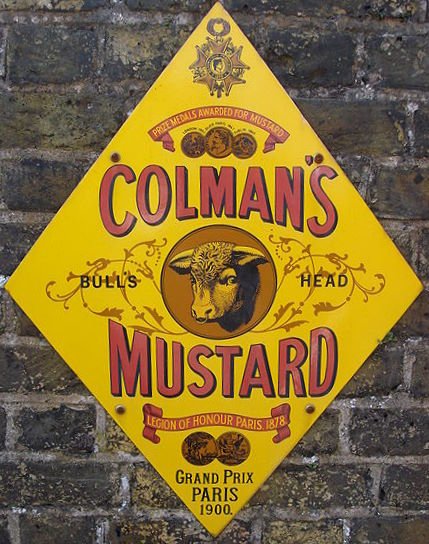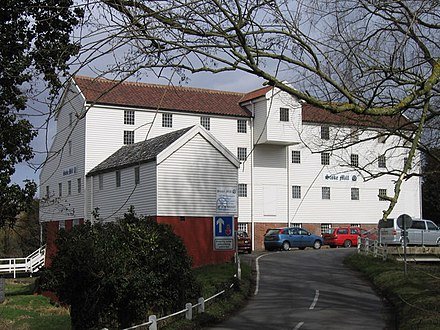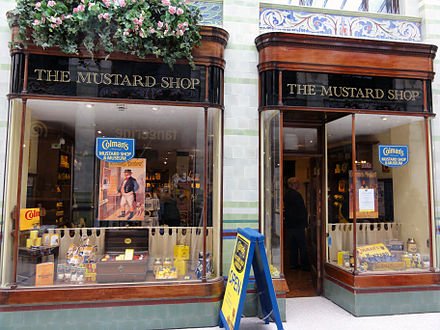British Heritage
Remember, Cherish, Learn.
beta
Colman's - Its Mustard! (Since 1814)
A Spice of British Heritage.
For more than two centuries, the rich, tangy flavour of Colman's Mustard has been a familiar and beloved part of British cuisine. Established in 1814, the English manufacturer's enduring legacy is one steeped in exceptional culinary craftsmanship, ground-breaking innovation, and a deep-rooted sense of community. As one of the oldest existing food brands, Colman's Mustard is undeniably an integral piece of Britain's gastronomic heritage.
The history of Colman's began in the early 19th century when Jeremiah Colman commenced mustard production at a water mill in the village of Bawburgh, near Norwich. Jeremiah's innovation lay in his unique blend of brown mustard (Brassica juncea) with white mustard (Sinapis alba) to create the signature tangy flavour we recognise today.
In 1814, Jeremiah founded Colman's of Norwich at the Stoke Holy Cross mill on the River Tas. The venture proved successful, and in 1823, Jeremiah welcomed his adopted nephew, James, into the business. This partnership marked the birth of J. & J. Colman.
The mid-19th century saw Jeremiah's son, J.J. Colman, take the helm. By 1865, the business relocated to a substantial factory at Carrow Road, a purchase from the Norfolk Railway. This location, lying south of Norwich, would remain the company's heartland until the Norwich closure.
A hallmark of Colman's identity is its distinctive yellow packaging and bull's-head logo, introduced in 1855. This distinctive branding marked a turning point, elevating the company's public recognition and embedding it in the cultural fabric of Britain. A testament to its quality and reputation, Colman's was granted the Royal Warrant in 1866 as manufacturers of mustard to Queen Victoria, a prestige that has persisted, with the Royal household still favouring Colman's today.
In a notable social revolution, the Colman family pioneered welfare initiatives in the mid-19th century, opening a school for employees' children in 1857 and hiring a nurse to tend to sick staff members in 1864. This commitment to social welfare was far from common at the time and is a significant part of the company's heritage.
From 1896, Jeremiah Colman assumed the position of chairman. Under his leadership, Colman's expanded its influence and market share, acquiring rival mustard maker Keen Robinson & Company in 1903. This strategic acquisition aimed to reduce competition within the mustard industry, bringing with it the Robinsons barley water and baby food business. By 1909, the company employed 2,300 people, reflecting its growth and success.
In 1926, Colman's further extended its global reach, acquiring American mustard manufacturer French's with Reckitt for £750,000. In 1938, the company merged with Reckitts and Sons of Hull, establishing the Reckitt & Colman household products conglomerate.
After being the main sponsors of Norwich City Football Club from 1997 to 2001, Colman's experienced significant changes. The business was demerged in 1995, and Colman's became part of Unilever UK Ltd. In addition to mustard, the company broadened its product range to include condiments, sauces, and other foodstuffs.
However, in January 2018, it was announced that Colman's would leave its long-standing Norwich base, where it had produced its condiments for 160 years. Production moved to Burton-on-Trent and Germany, with the last jar of mustard leaving the Carrow plant in Norwich in 2019.
Despite the physical departure, Colman's maintains strong links with Norwich, its founding family honoured through landmarks like Colman Road, Colman's First and Middle Schools, and the University of East Anglia's Colman House residence.
Beyond its contribution to British cuisine, Colman's has had a significant impact on British society and culture. The Mustard Shop in Norwich, which traded from 1973 to April 2017, served both as a retail operation and a tourism attraction, drawing mustard enthusiasts from far and wide.
In the realm of advertising, Colman's has been associated with several memorable campaigns. The 1920s saw the employment of renowned writer Dorothy L. Sayers, and her collaboration with artist John Gilroy birthed "The Mustard Club" for Colman's Mustard. Slogans such as "Come on Colman's, light my fire" etched the brand deeper into the national consciousness in the late 20th century.
Today, Colman's continues to provide the British table and beyond with a range of sauces and condiments, including Bramley Apple Sauce, Classic Mint Sauce, Cranberry Sauce, Fresh Garden Mint, Horseradish Sauce, Seafood Sauce, Sweet Mint Jelly, and Tartare Sauce. Its continued success is a testament to its lasting quality and the integral role it plays in the rich tapestry of British gastronomic heritage.
Despite changes in ownership and location, the essence of Colman's—its signature mustard, distinctive yellow packaging, and bull's head logo—remains the same. A jar of Colman's Mustard is not merely a condiment; it is a symbol of British culinary history, a heritage that spans over 200 years and continues to spice up dishes around the world.
Foundational Years and Expansion
The history of Colman's began in the early 19th century when Jeremiah Colman commenced mustard production at a water mill in the village of Bawburgh, near Norwich. Jeremiah's innovation lay in his unique blend of brown mustard (Brassica juncea) with white mustard (Sinapis alba) to create the signature tangy flavour we recognise today.
In 1814, Jeremiah founded Colman's of Norwich at the Stoke Holy Cross mill on the River Tas. The venture proved successful, and in 1823, Jeremiah welcomed his adopted nephew, James, into the business. This partnership marked the birth of J. & J. Colman.
The mid-19th century saw Jeremiah's son, J.J. Colman, take the helm. By 1865, the business relocated to a substantial factory at Carrow Road, a purchase from the Norfolk Railway. This location, lying south of Norwich, would remain the company's heartland until the Norwich closure.
Distinctive Branding and Royal Recognition
A hallmark of Colman's identity is its distinctive yellow packaging and bull's-head logo, introduced in 1855. This distinctive branding marked a turning point, elevating the company's public recognition and embedding it in the cultural fabric of Britain. A testament to its quality and reputation, Colman's was granted the Royal Warrant in 1866 as manufacturers of mustard to Queen Victoria, a prestige that has persisted, with the Royal household still favouring Colman's today.
Social Revolution and Acquisitions
In a notable social revolution, the Colman family pioneered welfare initiatives in the mid-19th century, opening a school for employees' children in 1857 and hiring a nurse to tend to sick staff members in 1864. This commitment to social welfare was far from common at the time and is a significant part of the company's heritage.
From 1896, Jeremiah Colman assumed the position of chairman. Under his leadership, Colman's expanded its influence and market share, acquiring rival mustard maker Keen Robinson & Company in 1903. This strategic acquisition aimed to reduce competition within the mustard industry, bringing with it the Robinsons barley water and baby food business. By 1909, the company employed 2,300 people, reflecting its growth and success.
In 1926, Colman's further extended its global reach, acquiring American mustard manufacturer French's with Reckitt for £750,000. In 1938, the company merged with Reckitts and Sons of Hull, establishing the Reckitt & Colman household products conglomerate.
Recent History and Closure
After being the main sponsors of Norwich City Football Club from 1997 to 2001, Colman's experienced significant changes. The business was demerged in 1995, and Colman's became part of Unilever UK Ltd. In addition to mustard, the company broadened its product range to include condiments, sauces, and other foodstuffs.
However, in January 2018, it was announced that Colman's would leave its long-standing Norwich base, where it had produced its condiments for 160 years. Production moved to Burton-on-Trent and Germany, with the last jar of mustard leaving the Carrow plant in Norwich in 2019.
Despite the physical departure, Colman's maintains strong links with Norwich, its founding family honoured through landmarks like Colman Road, Colman's First and Middle Schools, and the University of East Anglia's Colman House residence.
Cultural Impact and Publicity
Beyond its contribution to British cuisine, Colman's has had a significant impact on British society and culture. The Mustard Shop in Norwich, which traded from 1973 to April 2017, served both as a retail operation and a tourism attraction, drawing mustard enthusiasts from far and wide.
In the realm of advertising, Colman's has been associated with several memorable campaigns. The 1920s saw the employment of renowned writer Dorothy L. Sayers, and her collaboration with artist John Gilroy birthed "The Mustard Club" for Colman's Mustard. Slogans such as "Come on Colman's, light my fire" etched the brand deeper into the national consciousness in the late 20th century.
A Legacy of Flavour
Today, Colman's continues to provide the British table and beyond with a range of sauces and condiments, including Bramley Apple Sauce, Classic Mint Sauce, Cranberry Sauce, Fresh Garden Mint, Horseradish Sauce, Seafood Sauce, Sweet Mint Jelly, and Tartare Sauce. Its continued success is a testament to its lasting quality and the integral role it plays in the rich tapestry of British gastronomic heritage.
Despite changes in ownership and location, the essence of Colman's—its signature mustard, distinctive yellow packaging, and bull's head logo—remains the same. A jar of Colman's Mustard is not merely a condiment; it is a symbol of British culinary history, a heritage that spans over 200 years and continues to spice up dishes around the world.
- Colman'sen.wikipedia.org








